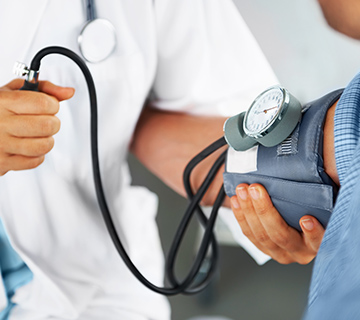The Dangerous Effects of Hypertension on Your Body

High blood pressure (also known as hypertension) is a condition that occurs when the pressure in your arteries and blood vessels is too high. It’s often called the “silent killer” because there are typically no warning signs or symptoms. But what does high blood pressure actually do to parts of your body? Read on to find out.
Brain
In order for your brain to work properly, it’s important to make sure it has adequate blood supply. An increase in blood pressure weakens the vessels and can cause them to narrow or leak. Irregular blood flow to the brain can then lead to a transient ischemic attack—otherwise known as a ministroke. And if a blood vessel ruptures and clots, it can deprive your brain of oxygen and nutrients, and ultimately lead to a full-blown stroke.
Blocked blood flow from high blood pressure has also been linked to dementia, Alzheimer’s disease and other types of cognitive impairment.
Heart
If blood is like gas in a car, consider your heart to be the engine. When blood is pumped uncontrollably throughout the body, it can take a major toll on your heart by making it work harder than it needs to. For example, high blood pressure can cause coronary arteries to narrow, making it difficult for blood to enter your heart. It can also cause the left ventricle (which pushes oxygen-rich blood to the rest of the body) to become too stiff to function properly. Over time, problems like these can lead to irregular heartbeats, heart attack, heart failure or even sudden cardiac death.
Arteries
In addition to coronary artery disease mentioned above, high blood pressure can damage other areas in your body. Too much fat in your diet can get stuck along artery walls. This hardens the arteries, and makes it difficult for blood to pass throughout your body.
When an artery gets too clogged, it can cause a section of it to swell into an aneurysm. If the aneurysm ruptures, it can cause life-threatening internal bleeding.
Kidneys
Kidneys help remove waste and filter clean blood back to your body. However, high blood pressure can scar the glomeruli that are responsible for filtering blood. When this happens, dangerous amounts of excess toxins accumulate in the blood vessels. Not only are you at risk for an aneurysm, but it’s also a common cause of kidney failure.
Eyes
The vessels that supply blood to your eyes are especially tiny and delicate. High blood pressure can cause excess fluid to build up, block blood flow to the optic nerve, or even rupture. These all can lead to bleeding in the eye, blurred vision, or even blindness.
Reproductive Organs
High blood pressure can also restrict blood flow during arousal. For men, less blood flow leads to difficulty maintaining an erection. For women, decreased blood flow can decrease arousal and ability to climax.
Learn more about how to manage high blood pressure with our Hypertension Management Program.


